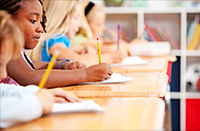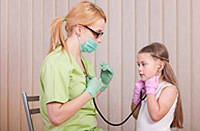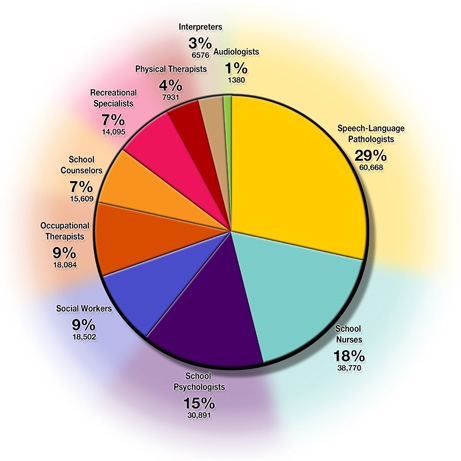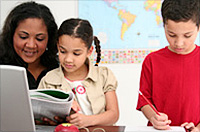What are related services for students with disabilities and how are they provided?
Page 1: Overview of Related Services
 Related services* are the supportive services or activities necessary for some students with disabilities to maximize their educational outcomes. Any related service or support that helps a student to benefit from or achieve the goals set out in his or her individualized education program (IEP) should be provided by the appropriate related services personnel. Special education and related services are intended to be flexible to meet the needs of an individual student. Appropriately matched to those needs, related services can assist students with disabilities by helping them to:
Related services* are the supportive services or activities necessary for some students with disabilities to maximize their educational outcomes. Any related service or support that helps a student to benefit from or achieve the goals set out in his or her individualized education program (IEP) should be provided by the appropriate related services personnel. Special education and related services are intended to be flexible to meet the needs of an individual student. Appropriately matched to those needs, related services can assist students with disabilities by helping them to:
individualized education program (IEP)
glossary
- Participate in the general education curriculum with their peers
- Meet their annual educational goals
- Take part in extracurricular and nonacademic activities
related service providers
glossary
 The additional support provided through related services and related services personnel (also known as specialized instructional support personnel) can help a student in an area of need such as writing, speaking, or moving. There is a wide range of special needs; therefore, there are many different types of related services. Related services might meet a student’s school transportation requirements or help with his or her social-emotional needs. As with special education, related services are not meant to be a one-size-fits-all solution, nor are they disability specific. Rather, related services should be associated with the student’s IEP goals and called out in the IEP. They are intended to help students meet their IEP goals and to be tied to those specific educational outcomes, rather than be mere isolated services. Related services in schools may include but are not limited to:
The additional support provided through related services and related services personnel (also known as specialized instructional support personnel) can help a student in an area of need such as writing, speaking, or moving. There is a wide range of special needs; therefore, there are many different types of related services. Related services might meet a student’s school transportation requirements or help with his or her social-emotional needs. As with special education, related services are not meant to be a one-size-fits-all solution, nor are they disability specific. Rather, related services should be associated with the student’s IEP goals and called out in the IEP. They are intended to help students meet their IEP goals and to be tied to those specific educational outcomes, rather than be mere isolated services. Related services in schools may include but are not limited to:
- Audiology
- Counseling services
- Early identification and assessment of disabilities in children
- Interpreting services
- Medical services (for diagnostic or evaluation purposes)
- Occupational therapy
- Orientation and mobility services
- Parent counseling and training
- Physical therapy
- Psychological services
- Recreation including therapeutic recreation
- Rehabilitation counseling
- School health services and school nurse services
- Social work services in schools
- Speech-language pathology services
- Transportation
The chart below displays the percentages of related service providers by the type of service.

Adapted from the Data Accountability Center. 2009 School year. ideadata.org
 Because they are tailored to meet the specific needs of individuals with disabilities, it is not possible for IDEA ’04 to offer a complete and exhaustive list of the available related services. Despite this open definition, however, there are some limitations to what related services can include. For example, related services do not include the provision of surgically implanted devices such as cochlear implants or baclofen pumps. On the other hand, related service providers do routinely check some devices to make sure they are on or functioning properly, for example making certain that a student is wearing his hearing aid and that the hearing aid’s battery is working, or simply being aware of the warning signs that a device isn’t functioning properly by noticing changes in the student’s perceptions of sounds.
Because they are tailored to meet the specific needs of individuals with disabilities, it is not possible for IDEA ’04 to offer a complete and exhaustive list of the available related services. Despite this open definition, however, there are some limitations to what related services can include. For example, related services do not include the provision of surgically implanted devices such as cochlear implants or baclofen pumps. On the other hand, related service providers do routinely check some devices to make sure they are on or functioning properly, for example making certain that a student is wearing his hearing aid and that the hearing aid’s battery is working, or simply being aware of the warning signs that a device isn’t functioning properly by noticing changes in the student’s perceptions of sounds.
cochlear implant
glossary
baclofen pump
glossary
For Your Information
Related services in schools are provided to students with IEPs and their families at no charge. However, students might have disability related therapy needs outside of what can be offered in a school setting, for example a regimen of range-of-motion exercises or post-surgical treatment. These needs are often addressed in a clinical setting and generally covered through insurance and not through the school system. Further, services offered by a doctor are usually not considered a related service.
* Note: The Every Student Succeeds Act (ESSA) also refers to related services and related services personnel as specialized instruction and specialized instructional support personnel, respectively.